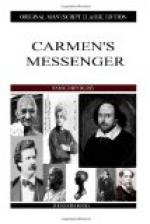“He has gone to meet somebody; but why did he take the provisions?”
“Maybe he wanted to give them to the ither man.”
“But why should the other need the food?”
“Weel,” said Pete, “if I was looking for a hidie-hole convenient to the town, I’d no’ find much fault with yon’ auld mine. Maybe it’s dry, an’ the frost wouldna’ get far in.”
Foster started, for he thought Pete had guessed right. He and Lawrence had camped in the open in colder weather than was often felt in British Columbia, and as wood was plentiful, there was no reason the man should not make a fire after dark, if he could find an outlet for the smoke. He must now find out who was hiding in the mine, but thought he knew, for vague suspicions suddenly got clear.
To begin with, the fellow who watched Telford at the hotel was either a policeman or a private detective in Hulton’s pay. Then Foster had lost Daly’s track at Banff, which was not very far off, and taking it for granted that Telford belonged to the gang, it was logical to suppose that he had arranged a meeting with Daly and Walters. On arrival Daly had found that the town was watched, but was either unable to leave it without being followed or detained by his business with the others. In consequence, he had taken refuge in the mine.
Foster sent Pete away and smoked another pipe. He would have liked to visit the mine at once, but if he went, would meet Telford coming back or find him when he reached the spot, and he must see Daly alone. He ought, of course, to warn the man he thought a detective, but did not mean to do so, and this resolve brought up a problem he had tried to solve before: what could he offer Daly in return for his keeping Lawrence’s secret?
If the fellow had killed Fred Hulton, it was unthinkable that he should help him to escape. Foster felt that he had perhaps, in a sense, already become Daly’s accomplice, but meant to save his comrade and keep his promise to Alice. He would see Daly in the morning and decide then what line to take; after all, luck might help him again. Then he knocked out his pipe and went to bed.
After breakfast next morning he called for Pete and walked carelessly to the main bridge. He, however, took his pistol and when they reached the woods Pete cut a heavy stick. Foster did not expect to use force, but it was better to be prepared. While Pete was trimming his cudgel they heard the heavy snorting of a locomotive and a plume of smoke moved across the town. Then they saw through an opening in the trees the cars roll along the mountain side. The Montreal express had stopped on its journey east, but Foster was preoccupied and thought nothing of this.
The snow was very soft when they plodded up the path among the trees, but it was not far to the clearing, and Foster stopped at its edge. He had met nobody, and the woods were silent except for the dying roar of the train, which came faintly down the valley. There was no smoke, but Daly would put out his fire when it got light. Crossing the wet snow noiselessly, he made for the shack and when he reached it beckoned to Pete.




